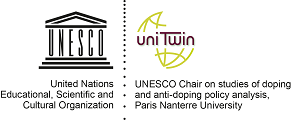The Chair aims to bring together a number actors:
- Do you work in an anti-doping institution? Do you lead an academic team?Anti-doping activist or institutions, you can contribute to the Chair. Your experience and resources can participate in the project and we invite you to contact us.
We have identified three ways of working with us.
It is a "convention" between the Chair and a university, an academic team, a governmental authority or an NADO.
This approach would provide useful insights for the anti-doping community. It would also allow the extension of the university network that can contribute to building further knowledge.
The contractualisation can take the form of a service if an institution needs to carry out a research project. It can also be used for building a network aiming to structure long-lasting collaborations with academic teams.
This contractualisation would make it possible for the Chair to make international comparisons.
Finally, it assists the UNESCO Secretariat in monitoring the Convention.
The document that will set the framework of the contractualisations will be available soon.
By supporting the Chair with a grant, you will promote the realisation of international comparisons. These research projects are relatively expensive, but they provide the anti-doping community with relevant insights and new knowledge on doping and anti-doping policies.
You will also show your support for anti-doping research.
Do you want to have national staff able to conduct research programs that will be useful for your institution straight away? Offering the opportunity to follow the Master of the Chair to one or two members of your staff can make it possible.
Students will be able to carry out directly useful research as part of the training program that will be supervised by the educational team of the Chair. In one or two years (you can access the master’s program in the first year or directly in the second) they will be able to meet your needs.
Students will receive an official Master’s degree from a recognized French university, the
Paris Nanterre University.
They will equally be able to participate in the Chair's network and in international comparative research projects.
The full program of this Master’s is available
here. You can also download a flyer containing further information by clicking on this
link. In order to register in the Master’s program, follow the instructions on the following
webpage.
Do not hesitate to contact us if you want to have further information or if you need assistance. - ResearchersYou can participate in the Chair individually or with a team.
If you have already worked on the issue of doping or on public policy, we would be happy to discuss and share our work experience with you.
• If you wish to address the issue of doping, we can help you with creation of research project, participate in your training (theoretical approaches, methodological approaches, etc.).
• We can consider signing conventions with your university to facilitate students and researchers exchange.
• We strive to digitally bring together a variety of works on doping and the fight against doping and public resources (parliamentary debates, blogs of anti-doping activists, etc.). The objective is to build a
computerized research center similar to those developed by the
Group of Pragmatic and Reflexive Sociology (EHESS) in the context of a sociology of environmental and health risks.







